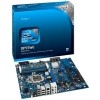- Qualcomm Launches Snapdragon 4 Gen 2 Mobile Platform
- AMD Launches Ryzen PRO 7000 Series Mobile & Desktop Platform
- Intel Launches Sleek Single-Slot Arc Pro A60 Workstation Graphics Card
- NVIDIA Announces Latest Ada Lovelace Additions: GeForce RTX 4060 Ti & RTX 4060
- Maxon Redshift With AMD Radeon GPU Rendering Support Now Available
Intel DP55WG

For most consumers, Intel might not be the first name to come to mind when building a new PC, but the company offers a rather robust line-up of boards for each chipset it releases. We’re looking at the $140 “mainstream” DP55WG, which has an simple overall feature-set, but includes support for IR and also NVIDIA’s SLI.
Page 5 – System: PCMark Vantage
Futuremark is no stranger to most any enthusiast out there, as the company’s benchmarks have been used to gauge our PC’s worth for many years. Although the company’s 3DMark Vantage (which we also use for testing) is arguably more popular than PCMark Vantage, the latter is a great tool to measure a system’s overall performance across many different scenarios.
Unlike SYSmark, PCMark is more of a synthetic benchmark, as very little is seen to the user during the run. However, each test tackles a specific and common scenario that’s typical of many computer users – enthusiasts and regular users alike – such as photo manipulation, gaming, music conversion, productivity, et cetera.
The main problem right now with PCMark is its inability (at least for us) to produce an overall score when being run under Windows 7. Even when run in compatibility mode (which is required by 3DMark), the application will crash during the Memories test, despite that particular test executing fine when run as its own suite. So, no overall score is produced, but the seven individual scores are.
While SYSmark uses modest numbers for their scoring, ranging in the hundreds, Futuremark opts for much higher scores with their entire suite, with the lowest being the TV and Movies, ranging around the 6,000 mark. On the high-end, our Intel SSD is capable of pushing the test’s HDD scenario well beyond 20,000.

As we’d expect, the boards here flip/flop their strengths and weaknesses here, although neither could be considered bad in any scenario. A difference of less than 5% in a given scenario isn’t going to be easy to recognize in a real-world test. Intel’s board once again didn’t excel in any test, and actually came behind in most of them. The exception is the HDD test, which really seems to be sporadic in its results from board to board.
Support our efforts! With ad revenue at an all-time low for written websites, we're relying more than ever on reader support to help us continue putting so much effort into this type of content. You can support us by becoming a Patron, or by using our Amazon shopping affiliate links listed through our articles. Thanks for your support!






